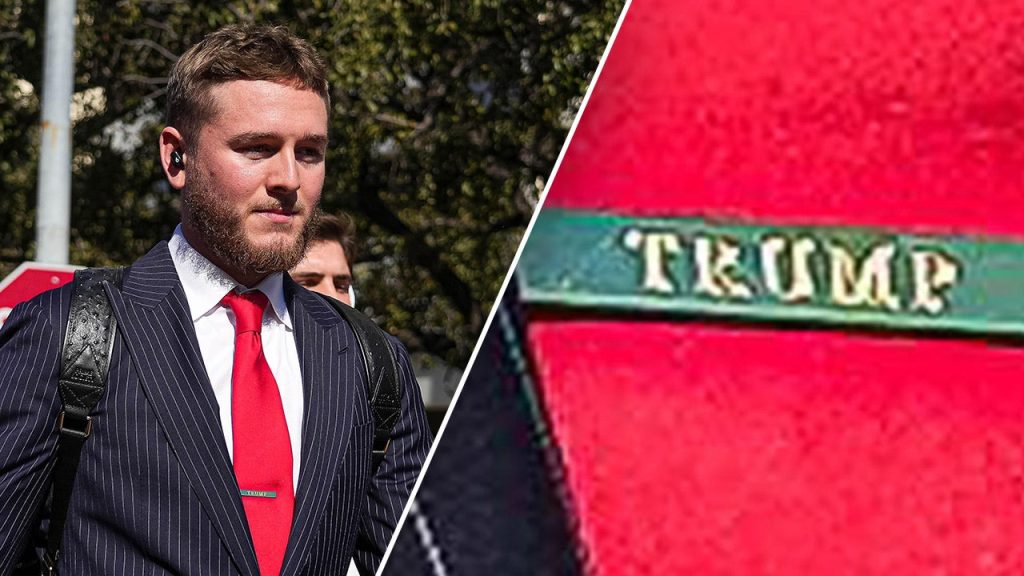Quinn Ewers, quarterback for the Texas Longhorns, made a bold political statement by wearing a tie clip engraved with “Trump” as he arrived for the high-stakes College Football Playoff game against the Clemson Tigers. This overt display of support for the former president, Donald Trump, comes amidst a backdrop of increasing political engagement by athletes, particularly in the realm of football. Ewers’s gesture follows previous social media posts indicating his admiration for Trump, including sharing an image of Trump post-assassination attempt and another featuring Trump alongside JD Vance, which Ewers captioned “Legendary.” This public endorsement highlights the intersection of sports and politics, a convergence that has become increasingly pronounced in recent years. Ewers’ decision to wear the tie clip to such a prominent event underscores the willingness of some athletes to express their political views, even on a national stage.
Ewers’s demonstration of support for Trump echoes a trend seen among other athletes, particularly in the aftermath of Trump’s presidential victory. Several instances of athletes aligning themselves with Trump have emerged, ranging from mimicking his signature “YMCA” dance to openly wearing “Make America Great Again” apparel. San Francisco 49ers player Nick Bosa’s decision to wear a MAGA hat, for instance, drew both support and criticism, ultimately resulting in an $11,000 fine. These instances highlight the complex relationship between sports and politics, where athletes’ expressions of political allegiance can be met with diverse reactions. The willingness of athletes to publicly endorse political figures often sparks debate about the appropriateness of such displays and the potential consequences for their careers and public image.
The intersection of sports and politics extends beyond individual athletes to encompass large-scale events. Trump’s attendance at the Army-Navy game, for instance, arguably contributed to the game’s record-breaking viewership, attracting over 9 million viewers. This suggests the significant influence political figures can exert on sporting events and their audience reach. Similarly, Trump’s presence at NFL games and UFC events further underscores his engagement with the sporting world and his recognition of its potential as a platform to connect with a broad audience. This intertwining of sports and politics raises questions about the implications for both the sporting world and the political landscape.
Ewers’s decision to wear the Trump tie clip during the pre-game arrival for a nationally televised playoff game elevates his political statement beyond a personal expression to a public endorsement on a significant platform. The timing of this display, just before a crucial game with national implications, amplifies the message and invites further scrutiny of the intersection of sports and politics. While some may view it as simply an expression of personal belief, others may interpret it as a deliberate attempt to inject political discourse into a sporting event. This highlights the challenges and complexities that arise when athletes leverage their platform to express political views.
The sporting world has increasingly become a stage for political expression, with athletes often using their visibility to champion causes or endorse political figures. While this can raise awareness and encourage dialogue, it also raises questions about the boundaries between sports and politics. Some argue that sports should remain a sanctuary from political divisions, while others believe that athletes have a right and responsibility to use their platform to speak out on issues they care about. This ongoing debate highlights the evolving relationship between sports and political expression, with Ewers’s tie clip serving as a recent example of this complex interplay.
The future of athlete activism and political endorsements within the sporting world remains to be seen. As athletes continue to use their platform to express their views, the dialogue surrounding the intersection of sports and politics will likely intensify. Ewers’s public display of support for Trump underscores this trend and adds another layer to the ongoing conversation about the role of athletes in political discourse. The reactions to his gesture, both positive and negative, reflect the wider societal divide on these issues and the challenges of navigating the increasingly blurred lines between sports and politics.

